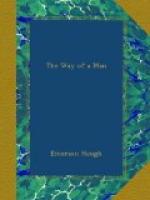By chance I found myself with both hands on his arms, and I knew that no man could break that hold when once set, for vast strength of forearm and wrist was one of the inheritances of all men of the Cowles family. I drew him steadily to me, pulled his head against my chest, and upended him fair, throwing him this time at length across my shoulder. I was sure I had him then, for he fell on his side. But even as he fell he rose, and I felt a grip like steel on each ankle. Then there was a snake-like bend on his part, and before I had time to think I was on my face. His knees were astride my body, and gradually I felt them pushing my arms up toward my neck. I felt a slight blow on the back of my head, as though by the edge of the hand—light, delicate, gentle, but dreamy in its results. Then I was half conscious of a hand pushing down my head, of another hand reaching for my right wrist. It occurred to me in a distant way that I was about to be beaten, subdued—I, John Cowles!
This had been done, as he had said of my own work with Singleton, as much by the momentum of my own fall as by any great effort on his part. As he had said regarding my own simple trick, the time of this was perfect, though how far more difficult than mine, only those who have wrestled with able men can understand.
For the first time in my life I found myself about to be mastered by another man. Had he been more careful he certainly would have had the victory over me. But the morning was warm, and we had worked for some moments. My man stopped for a moment in his calm pinioning of my arms, and perhaps raised his hand to brush his face or push back his hair. At that moment luck came to my aid. He did not repeat the strange gentle blow at the back of my head—one which I think would have left unconscious a man with a neck less stiff—and as his pressure on my twisted arm relaxed, I suddenly got back my faculties. At once I used my whole body as a spring, and so straightened enough to turn and put my arm power against his own, which was all I wanted.
He laughed when I turned, and with perfect good nature freed my arm and sprang to his feet, bowing with hand upreached to me. His eye had lost its peculiar stare, and shone now with what seemed genuine interest and admiration. He seemed ready to call me a sportsman, and a good rival, and much as I disliked to do so, I was obliged to say as much for him in my own heart.
“By the Lord! sir,” he said—with a certain looseness of speech, as it seemed to me, for a minister of the gospel to employ, “you’re the first I ever knew to break it.”
“’Twas no credit to me,” I owned. “You let go your hand. The horse is yours.”
“Not in the least,” he responded, “not in the least. If I felt I had won him I’d take him, and not leave you feeling as though you had been given a present. But if you like I’ll draw my own little wager as well. You’re the best man I ever met in any country. By the Lord! man, you broke the hold that I once saw an ex-guardsman killed at Singapore for resisting—broke his arm short off, and he died on the table. I’ve seen it at Tokio and Nagasaki—why, man, it’s the yellow policeman’s hold, the secret trick of the Orient. Done in proper time, and the little gentleman is the match of any size, yellow or white.”




